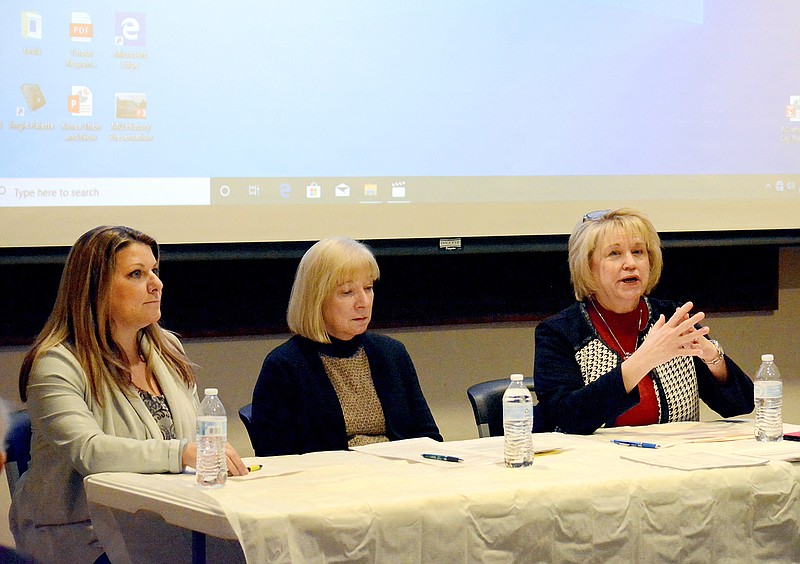More than 30 people interested in the push for Medicaid expansion in Missouri attended a forum on the subject Tuesday evening at Missouri River Regional Library.
"Medicaid Money in Missouri" featured a panel made up of Mary Becker, a senior vice president for the Missouri Hospital Association; Kate Reichard, director of governmental affairs for Missouri Primary Care Association; and Connie Mihalevich, an MU Health Care employee who is knowledgeable about Medicaid eligibility, led the discussion.
The women discussed the challenges facing sick and low-income Missourians who need health care.
"The one positive thing about Missouri Medicaid is that we go up to 300 percent of the poverty level for children. So, we're one of the better states for that coverage," Mihalevich said. "I think we are the worst for covering adults. We're at the bottom."
The forum was presented by Jefferson City Area Indivisible and other partners, who support a ballot initiative that would expand Medicaid.
Missouri's hospitals have long been advocates of medical coverage, Becker said, whether through Medicare or Medicaid.
There was a time when Missouri was one of the better states, when it came to Medicaid coverage, Becker said. The state was really proud it had a high number of people with eligibility and there were a lot of people covered.
"We're going backward, instead of forward," she said. "In Missouri hospitals now, if you have no health insurance, you wait until your condition is bad. You show up - usually to an emergency department - and they treat you."
Hospitals have an obligation to treat
anybody who walks through the door, she said.
In 2017, 122 of Missouri's hospitals provided more than $1.4 billion in uncompensated care - charity care and bad debts, she explained.
That has to have an affect on private health insurance rates and the cost of health care overall, she continued.
"It has to go somewhere," Becker said. "That's bad debt that can't be collected."
Uncompensated care cost $166 million more in 2017 than it did in 2016.
Many of those uncompensated procedures could be avoided if people had continuing health care through expanded Medicaid, the women said.
The Affordable Care Act directed all states and the District of Columbia to expand their Medicaid programs to cover all adults with incomes up to 138 percent of the federal poverty level. A subsequent U.S. Supreme Court ruling made the expansion optional, according to a University of Washington analysis of the fiscal effects of expansion.
Twenty-five states initially expanded their programs in 2014, according to the report "Analysis of the Fiscal Impact of Medicaid Expansion in Missouri." Eight states later expanded through legislative action. And four passed ballot initiatives to expand.
Healthcare for Missouri - a coalition of voters, patients, medical professionals, businesses and community organizations committed to expanding health care access to Missourians - is conducting the expansion initiative. It hopes to get Medicaid expansion on a 2020 ballot. To assure the initiative is on the ballot, organizers have to collect more than 142,000 signatures by May.
The past five years have given Missouri a lot of background to consider, the panelists said.
As an incentive, the federal government paid the cost of expansion for states that did so immediately, for the first three years. Then federal responsibility was to decline to 90 percent over the next three years (into 2020). the federal government pays 90 percent of states' cost for Medicaid expansion for all the other states that later expanded (and will for those that expand in the future).
Meanwhile, Becker said, its becoming more and more difficult, particularly in rural communities, for Missourians to receive proper health care.
"We know that a lot of our hospitals - especially rural hospitals - are on the brink," Becker said.
Since 2014, 14 Missouri hospitals have closed, nine of which served rural communities.
However, critics of Medicaid expansion said it will cost the state millions.
Not so, the panelists said.
The University of Washington report concluded if Missouri expands its Medicaid program, called MO HealthNet, the effect would be "budget neutral." It would actually save approximately $39 million in 2020, a relative push for a program that cost $10.3 billion in 2018.
Big savings would come over the next four years, according to the report. Without expansion, state spending on health costs would increase by approximately $800 million through 2024. However, through expansion, costs would decrease about $100 million over those four years, according to the report. It concludes expansion could save Missouri $932 million over four years.
Expansion would make Medicaid available to about 230,000 Missourians, the report offers.
Much of the panel was taken up as it fielded questions from listeners. One listener asked how the state can recoup federal taxes it has already paid that are being used by other states that have expanded Medicaid.
Expand Medicaid in Missouri, was their reply.
"That money is going to all the states who have expanded," Reichard said. "And, it's providing services to all those individuals who are healthier than (people in) Missouri."

